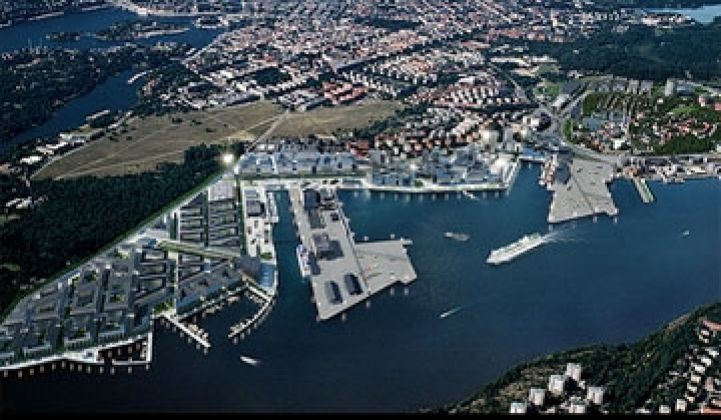Eco-cities are spreading around the world, from Dongtan in China to Moreland in Australia and Masdar in Abu Dhabi.
One of the granddaddies of this municipal experiment in sustainable living -- Hammarby Sjostad in Sweden -- is expanding, as well. A second, larger eco-community is under develop in Stockholm, known as the Stockholm Royal Seaport, and builders are moving ahead on additional sites in Malmo, Vaxjo and Gothenburg, according to Olov Hemstrom, head of consulting at the Swedish Trade Council.
The term 'eco-city' was coined more than two decades ago by theorist Richard Register in his book Ecocity Berkeley: Building Cities for a Healthy Future. The desire to create communities that use less energy, water and food and which produce less waste and CO2 emissions has gained steam in recent years.
Hemstrom said at the Nordic Green II conference that the most recent results of Hammarby Sjostad's "holistic" approach to metropolitan living are impressive. The suburb of 25,000 people uses 40 percent less energy and water than a typical community, and traffic has fallen by 40 percent.
This has been accomplished while holding construction costs to 2 percent to 3 percent more than a non-eco community. Property values since the community's founding have risen 25 percent.
The Stockholm Royal Seaport will exceed these results. "We want to do even better," he said. "The whole approach is integrated planning." The 35,000-person development is likely to take 10 years to develop.
At Hammarby Sjostad, household waste is carted to a waste-to-energy plant and used to heat buildings. Solar panels produce hot water, and triple-pane windows keep out the cold. Grey water from washing and domestic use is mined for biogas, which then fuels community buses. Rail and boat service keeps people from needing cars.
Technology has advanced to the point where Stockholm Royal Seaport should be close to energy-neutral, claims Hemstrom. This will reduce carbon emissions to 1.5 tonnes a person a year, or a two-fold improvement over Hammarby Sjostad.
The goal is to make the community a showcase and to be entirely fossil-fuel-free by 2030. Such an accomplishment would be another milestone in the eco-city movement.



